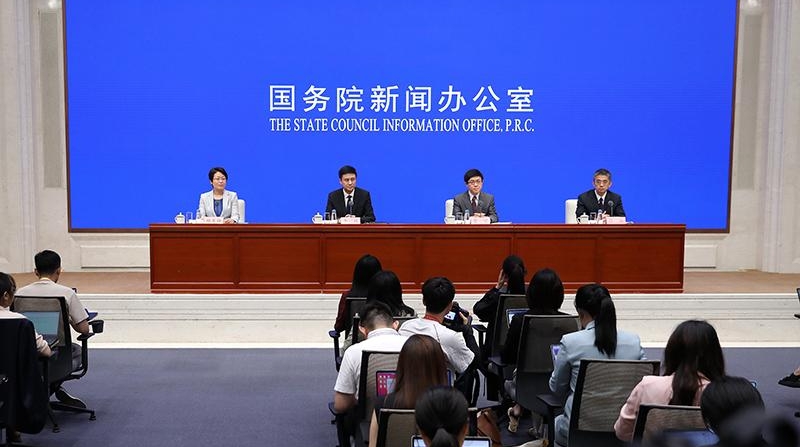Dazhong Daily:
We are aware that SAFE has been continuously advancing the facilitation of cross-border trade, investment and financing. What progress has been made in the first half of the year? And in what aspects has it brought convenience to enterprises? Thank you.
Li Bin:
Thank you for your questions. I'll take these. Your question involves many foreign-funded and foreign trade enterprises. We have been working hard to facilitate cross-border trade, investment and financing. In recent years, SAFE has adhered to the fundamental purpose of the financial sector serving the real economy, continuously deepened reform and opening up in the foreign exchange sector, and strengthened the supply of high-quality foreign exchange policies to promote the steady development of foreign trade and foreign investment. Concerning your questions, I would like to introduce the work in the first half of the year from three aspects:
First, we have expanded the coverage of trade facilitation policies. We have advanced high-level opening pilot programs for cross-border trade, and implemented facilitation policies for foreign exchange receipts and payments for high-quality enterprises. These policies now cover more small and medium-sized enterprises (SMEs) including specialized and sophisticated enterprises that produce new and unique products. In the first half of the year, transactions totaling over $700 billion were facilitated, with a year-on-year increase of 11%. We have actively supported the development of new business forms, such as cross-border e-commerce and comprehensive foreign trade services. We have encouraged more banks and payment institutions to shift from traditional trade verification methods toward technology-enabled, batch automated verification of electronic orders, providing efficient, convenient and safe foreign exchange settlement services for small, micro, and medium-sized cross-border e-commerce business entities. In the first half of the year, 510 million such transactions were processed nationwide.
Second, we have promoted the facilitation of cross-border investment and financing. There are several aspects to this. First, we have enhanced the convenience for foreign investment in China. By the end of 2024, we have piloted the cancellation of registration requirements for domestic reinvestment by foreign-invested enterprises in 19 locations, benefiting more than 600 enterprises and effectively improving their capital utilization efficiency. The registration of preliminary expenses for foreign investment in China has been cancelled. Foreign investors can directly open accounts in banks to receive preliminary expense funds when establishing foreign-invested enterprises in China, significantly shortening the fund turnover time and accelerating project implementation. Relevant policies have already been publicly solicited for opinions. Additionally, we have facilitated the allocation and management of funds between domestic and foreign member enterprises of multinational companies. In March this year, pilot programs for the integrated domestic and foreign currency fund pool business of multinational companies were further expanded to include 16 provinces and cities, including Tianjin, Hubei, Xinjiang, and Xiamen. Multinational companies were allowed to directly conduct partial capital account change transactions at banks. According to feedback, this can shorten business processing time by about 50%. In June, we also allocated $3.08 billion in investment quotas under the Qualified Domestic Institutional Investor (QDII) program to better meet the public's demand for investing in overseas financial products.
Third, the effectiveness of reforms in foreign exchange business operations continued to expand steadily. Through reforms in foreign exchange business operations, banks were able to streamline business processes, such as customer identification, document verification and risk monitoring. These reforms enable banks to allow high-quality customers to carry out foreign exchange transactions directly based on enterprise instructions, replacing the previous practice of reviewing documents individually. As a result, the average processing time has been reduced by more than 50%, bringing real convenience to enterprises and reducing banks' burden of verifying transactions as they are processed. Six new banks initiated reforms related to foreign exchange business operations during the first half of this year. To date, 22 banks have participated in such reforms, including large state-owned commercial banks, national joint-stock commercial banks, city commercial banks and foreign-funded banks, with business reach expanding nationwide. To date, participating banks have assessed over 20,000 first-class customers, a 23% increase compared with the end of 2024. Since the beginning of this year, the volume of cross-border revenue and expenditure transactions processed directly on customers' instructions has exceeded $200 billion.
Next, SAFE will strengthen reforms and innovation in foreign exchange management, provide greater convenience to trustworthy and compliant entities, and continuously increase the benefits felt by enterprises and the public.
That is all from me. Thank you.


 Share:
Share: 




 京公网安备 11010802027341号
京公网安备 11010802027341号